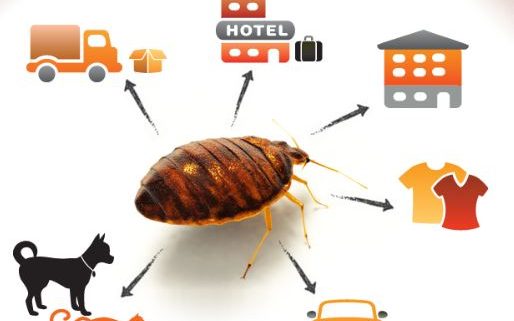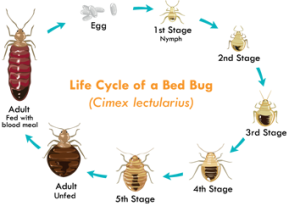Kings Exterminator Cincinnati: Efficient Pest Administration
Kings Exterminator Cincinnati: Efficient Pest Administration
Blog Article
A Malfunction of the Various Kinds Of Bug Control Solutions
In the realm of insect control, a multitude of techniques exist to combat the visibility and deal with of unwanted creatures. From the conventional use chemical pesticides to more ingenious biological control remedies, each method offers distinct advantages and limitations. As we navigate with the varied landscape of pest control remedies, understanding the ins and outs of each approach comes to be critical in establishing the most effective strategy. Keep tuned as we check out the nuanced globe of insect control strategies and find exactly how each type plays a distinct duty in safeguarding our environments.
Chemical Pesticides
Chemical chemicals are generally made use of in pest control to effectively get rid of a vast array of bugs and other parasites. These chemicals function by targeting the anxious system of the parasites, interrupting their regular functions, and ultimately leading to their demise. Making use of chemical pesticides has been a staple in the pest control industry for years because of their effectiveness and fast outcomes.

Nevertheless, it is important to use chemical pesticides with caution because of their possible hazardous results on the atmosphere and non-target species. Inappropriate application or overuse of these pesticides can bring about air pollution, injury to valuable pests, and resistance advancement in pest populations. As a result, it is crucial to adhere to safety standards and guidelines when utilizing chemical pesticides for parasite control.
Biological Control Approaches
Considering the possible environmental influences and risks related to chemical pesticides, organic control methods offer an even more sustainable approach to managing pest populaces. Biological control entails the usage of all-natural opponents, such as virus, killers, and parasites, to suppress bug populations. This technique is frequently extra targeted, impacting only the particular pest species while minimizing damage to valuable insects, people, and the environment.

When established, all-natural opponents can aid manage pest populations continuously without the demand for duplicated applications of chemicals. In addition, organic control is commonly much more economical and can assist lower pesticide resistance in parasite populaces over time.

Mechanical Parasite Control
Mechanical parasite control involves the physical control or elimination of parasites to handle their populaces properly. One usual example of mechanical pest control is utilizing traps to capture rats or insects.
An additional mechanical strategy is making use of obstacles such as screens, fences, or nets to block pests from going into details locations. By physically protecting against insects from accessing a place, the chance of invasions or damages can be dramatically reduced. Additionally, manual methods like handpicking pests off structures or plants can be reliable for smaller-scale invasions.
While mechanical parasite control approaches can be labor-intensive, they use a non-chemical choice that can be eco-friendly and termite care sustainable. By targeting parasites directly, mechanical control methods can help keep parasite populaces in check without counting on chemicals.
Natural Solutions
Making use of natural treatments for parasite control uses a green and lasting technique to handling pest populaces without resorting to chemical interventions. All-natural solutions include making use of substances originated from plants, minerals, or other naturally happening resources to deter or get rid of bugs. For example, growing certain natural herbs like basil, mint, or lavender around your building can ward off insects because of their strong aromas. Diatomaceous earth, a powder made from fossilized algae, can be utilized to deal with parasites like ants, cockroaches, and bed bugs by dehydrating their exoskeletons.
Additionally, crucial oils such as tea tree oil or neem oil have insecticidal homes that can efficiently manage pests while being secure for the setting. An additional natural remedy is introducing helpful insects like ladybugs or hoping mantises to your yard to take advantage of unsafe pests. By integrating these natural services into parasite monitoring methods, people can minimize their reliance on artificial chemicals and advertise a much healthier, much more well balanced ecological community.
Integrated Insect Monitoring
Integrated Pest Administration (IPM) is an extensive approach that incorporates numerous strategies to efficiently control pest populations while reducing dangers to human wellness and the environment. IPM entails the integration of several insect control methods such as biological control, environment adjustment, modification of cultural methods, and the usage of resistant crop selections. By using a combination of these techniques, IPM intends to minimize dependence on chemical pesticides, which can have unfavorable influence on ecosystems and human health and wellness.
One key aspect of IPM is the focus on avoidance. By applying steps to stop parasite invasions prior to they occur, such as maintaining appropriate sanitation and sealing access points, the need for responsive insect control actions is decreased. Tracking and regular assessments play a critical duty in IPM, enabling early detection of pest problems and punctual intervention.
Conclusion
To conclude, the various kinds of insect control options provide an array of options for effectively handling parasite problems. Chemical chemicals provide quick removal but may have environmental risks. Organic control approaches use all-natural predators to manage bugs. Mechanical bug control involves physical barriers or traps. All-natural remedies supply safe alternatives. Integrated Parasite Monitoring incorporates several methods for a holistic strategy to pest control. Each technique has its very own advantages and disadvantages, and selecting the most suitable service relies on the specific insect issue at hand.
Chemical pesticides are commonly utilized in insect control to effectively remove a wide range of pests and other parasites.Mechanical parasite control involves the physical manipulation or removal of insects to this article manage their populaces efficiently (Kings Bed bug exterminator Cincinnati).Utilizing all-natural solutions for pest control uses why not try these out a eco-friendly and sustainable technique to taking care of parasite populaces without resorting to chemical treatments.Integrated Insect Management (IPM) is a detailed approach that incorporates numerous strategies to properly manage pest populaces while lessening threats to human wellness and the atmosphere.In verdict, the numerous types of pest control options provide a range of options for efficiently handling insect invasions
Report this page